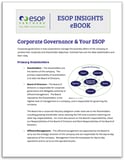Executive compensation sometimes ends up under scrutiny for closely held corporations, C corps and S corps alike.
Anti-abuse rules, effects of over- or under-compensation on business valuations, and potential impacts on rank-and-file employees’ ESOP account values all add complexity to conversations about ESOP executive compensation.
At the same time, ESOP companies need to be able to recruit and retain strong leaders to be competitive. Compensation strategies for executive leadership positions often involve offers that go beyond the salary and benefits of rank-and-file employees and include short-term and/or long-term incentives, equity compensation, and other components.
So it’s easy to understand why executive compensation can sometimes be a sticking point during the transition to an ESOP and throughout a plan’s lifecycle.
C corps and S corps receive differing tax treatment for payroll and shareholder dividends. Closely held C corps sometimes run into trouble for overcompensation, while closely held S corps can run the risk of undercompensating top executives.
All corporations must comply with Treasury regulations that specify shareholder/executive compensation must be:
- An ordinary and necessary expense
- Reasonable in amount
- Based on fair market value of services actually rendered
- Actually paid or incurred by the corporation
Corporations that are found under audit to be compensating executives disproportionately and not based on services rendered could incur big penalties. But executive compensation isn’t a fiduciary responsibility; it’s a business judgment — and therefore not an ERISA issue.
That doesn’t mean executive compensation decisions can’t impact an ESOP. Here are several key factors leaders need to carefully consider when setting executive compensation and structuring offers. An ESOP company’s board of directors may request an ESOP trustee review of proposed exec compensation; if the trustee is not external and is also a plan participant or beneficiary, governance issues can be particularly complicated.

FREE eBook: Corporate Governance & Your ESOP
This valuable eBook outlines the structure of corporate governance and the responsibilities inherent in each role involved.
Overcompensation Can Siphon Off Company Value
When a company nets very little income because it overcompensates executives (which can happen when a company is small and closely held), its valuation can reflect that. That’s why some valuation professionals “normalize” the numbers by estimating what a hypothetical buyer of the company would pay those executives, rather than actual executive compensation.
This raises questions about whether normalization makes sense in an environment where the shareholder (i.e., the ESOP trustee) doesn’t have the power to actually adjust executive pay. Generally, an ESOP trustee doesn’t set executive compensation — that task usually falls to the board of directors for the CEO, and often the CEO (sometimes with the help of a human resources consultant or specialist) controls the rest.
Normalizing executive compensation in a valuation can create a financial hazard in the following year, if the ESOP incurs a repurchase obligation and doesn’t have the cash — or the profits to afford credit — to buy out retirees. The trustee has a duty to the shareholders above all, and needs an awareness of executive compensation, including equity awards and incentive plans, as well as an understanding of how these obligations can affect company valuations.
Anti-Abuse Rules for S Corporation ESOPs
When S corporations were first allowed to be owned by an ESOP trust, there was an unintended surge in abusive use of ESOP-owned S corps as tax shelters. In response, IRC Section 409(p) prohibits disqualified persons (DPs) from receiving allocations or accruals of ESOP assets firing a non-allocation year. A non-allocation year is one in which DPs collectively own or are deemed to own at least 50% of the ESOP’s shares. This is of particular importance for closely-held corporations that involve family members.
ESOP plan documents must expressly and clearly provide definitions of “disqualified person” and “nonallocation year.” The plan document is also required to include language clearly and expressly communicating that no portion of employer stock held by an S corporation ESOP may be allocated to a DP during a nonallocation year.
Equity Compensation Can Impact ESOP Participant Account Values
While an ESOP extends beneficial ownership to all eligible employees, equity compensation like incentive stock options (ISOs), nonqualified stock options (NSOs), restricted stock, phantom stock, stock appreciation rights, and performance shares can be a particularly motivating component of leaders’ pay packages.
But stock-based compensation in an ESOP needs to be carefully selected and structured in order to avoid diluting ownership of existing shares or having an outsized, unintended impact on profitability. This effect can make equity compensation offers, ironically, less attractive — while also reducing the overall retirement benefit of the ESOP for rank-and-file plan participants.
But not all equity compensation types are alike, and careful consideration and planning can help prevent and control against over-dilution of share value for executives and retiring employees. It’s essential that company leadership is transparent and collaborative with the ESOP board and trustee in planning and overseeing equity compensation. Dilution doesn’t have to have a negative outcome for the company or ESOP shareholders.
Making Data-Informed Compensation Offers
In general, ESOP executive compensation tends to fall on the lean side, and depending on where the company is in the lifecycle of the ESOP, this may or may not be a concern. But when it comes to succession planning and actually executing on a former owner’s exit strategy, competitive compensation matters a great deal.
Compensation data is widely available, both for free through the Department of Labor’s Bureau of Labor Statistics and paid reports. Best practice in setting compensation involves using multiple data sources and performing equity research and analysis.
Integrating ESOP Sustainability and Company Growth Goals
Ultimately, compensation decisions within an ESOP should be undertaken with a holistic view of the company and the plan. Trustees, directors, and company leaders should all agree that a plan that’s best for the company is also in the best interest of its ESOP shareholders — so, while executive compensation may not be a direct fiduciary concern, its impacts on the company and its value certainly matter to everyone involved.
Protecting ESOP shareholder return requires good governance on the part of the sponsoring company. This underscores the value of careful selection of an ESOP trustee, as well as the potential value of outside directors on an ESOP board. Look to experts in compensation and consult with ESOP sustainability experts to evaluate executive compensation options. Learn more about key roles in ESOP governance and the “checks and balances” they uphold. Download our free ebook today by clicking below.

